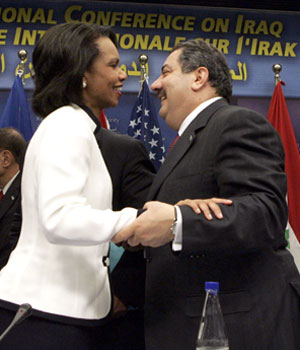
U.S. Secretary of State Condoleezza Rice kisses Iraqi Foreign Minister Hoshyar Zebari at the end of the final news conference of an international conference on Iraq, June 22, 2005 (REUTERS)
BRUSSELS, Belgium, AP – Secretary of State Condoleezza Rice played both provocateur and pragmatist in the Middle East this week, stirring the democratic pot in autocratic places but diplomatically declining to cross lines drawn by important allies.
In Saudi Arabia, where women cannot check into a hotel or go to school without written permission from a man, Rice stood as a personal example of what American political and social freedoms make possible: the first black woman to serve as secretary of state.
She pressed for women”s suffrage in Saudi Arabia, saying half a democracy is not a democracy. She said nothing, however, about the kingdom”s ban on women driving a car or about the religious police that chase and sometimes beat women for even slight or perceived infractions of strict codes of modesty.
"The United States, of course, approaches this topic as a friend," Rice said with the Saudi foreign minister at her side Monday in Riyadh.
"Obviously, countries will do this at their own speed, but we encourage reform to go forward as quickly as possible," she added.
Nathan Brown, senior associate at the Carnegie Endowment for International Peace, said that although the U.S. position in the region is fairly strong, the Bush administration has only a limited number of levers it can use on the governments there.
"What we can probably do is press them a little bit to loosen up or open up a little bit," Brown said in an interview in Washington. "But we can”t fundamentally remake these societies."
Rice pointedly told Egypt that the day must come when the rule of law replaces a law that allows the state to hold suspects for six months without trial.
"We should all look to a future when every government respects the will of its citizens, because the ideal of democracy is universal," she told an audience of 700 invited government officials, academics and students at the American University in Cairo.
Notably, the secretary also refused to challenge a separate law that outlaws the country”s largest opposition Muslim movement, the Muslim Brotherhood.
"We”re going to respect the laws of Egypt," she told reporters later.
Rice”s speech in Cairo was received with a mix of skepticism and hope. It was pitched to the history books, yet it had some immediate effects. During her visit on Monday, the opposition political movement Kifaya, which means "enough," was in the streets chanting against President Hosni Mubarak: "Give him a visa, Condoleezza, and take him with you."
The taunt was aimed both at the United States, which has made travel more difficult from several Arab countries since the terror attacks of Sept. 11, 2001, and at the nearly 25-year rule of Mubarak. It is also an example of the democratic ideal that citizens may freely criticize or petition their governments.
On Wednesday, a few hundred reform activists marched through a Cairo neighborhood denouncing the president without a riot policeman in sight. In previous protests, security forces have outnumbered protesters, surrounding them to prevent them from moving and sometimes scaring off passers-by and stopping people from joining.
President Bush set the spread of liberty in the Middle East as the defining charge of his second term, declaring an end to the era when the United States cozied up to dictators whose support it found convenient.
He singled out Saudi Arabia and Egypt as nations that could lead the way, and Rice”s visit to those nations is the most ready example of the Bush administration”s follow-through.
It is easier for the administration to lob spitballs at restrictive countries such as Iran and Syria, which have poor relations or none with the United States, than to take an ally to task.
Both Saudi Arabia and Egypt are rare Arab governments friendly to the United States even when public opinion, especially in Saudi Arabia, is often stridently anti-American.
Egypt, as the only Arab nation to make peace with Israel, is essential to the success of peace efforts between Israel and the Palestinians.
Saudi Arabia is a crucial exporter of oil and has extensive economic and military ties to the United States. As Rice said in Riyadh, Saudi Arabia is also a close partner of the United States in efforts to counter terrorism.
In the hotel where some of Rice”s party stayed, women scurried through the lobby sheathed head to toe in black cloaks called abayas. Some showed only their eyes, others their entire faces but never their hair.
"The United States … has to recognize that even after democratic processes have taken place, places are not going to look like the United States in terms of social mores," Rice told reporters later, as she left the region for international meetings in Europe.
"I think it is important for us to recognize some boundaries."
Political participation for women will unleash change in other areas, she said. The driving ban, perhaps the most glaring example for Americans of the constrained lives of Saudi women, is "just a line I”ve not wanted to cross," Rice said.

Luxembourg Foreign Minister Jean Asselborn (R) US Secretary of State Condoleeza Rice (C) and UN Secretary General Kofi Annan (L) discuss at the end of the international conference on Iraq 22 June 2005 (AFP)

US Secretary of State Condoleezza Rice gestures during a news conference at the end of the international conference on Iraq, at the EU Council, 22 June 2005, in Brussels (EPA)
